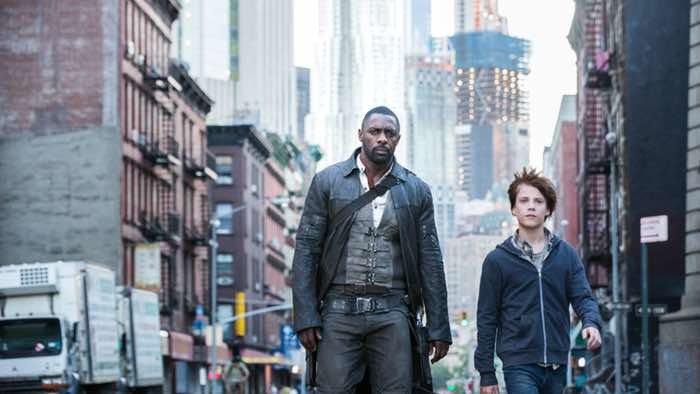There Are Better Movies Than This: 'The Dark Tower' Spoiler Review
(In our Spoiler Reviews, we take a deep dive into a new release and get to the heart of what makes it tick...and every story point is up for discussion. In this entry: the big screen adaptation of Stephen King's The Dark Tower.)The Man in Black fled across the desert, and The Dark Tower movie followed. Bringing Stephen King's fantasy-epic series to the big screen has been a highly-anticipated dream for many fans of the books. Long have they desired to see the realm of Mid-World realized on the silver screen; to see the adventures of Roland Deschain brought to life. And now that that day has finally come, the results are crushingly disappointing. Because The Dark Tower is one of the most frustrating types of films: it's neither excellent nor atrocious – it just is. A middling, often lazy film that just sort of lays there like an old, threadbare carpet.It's time to travel once again around the wheel and figure out just why this film is such a misfire, and how badly it forgets not only the face of its father but also the very source material that brought it into existence.Spoilers follow, of course.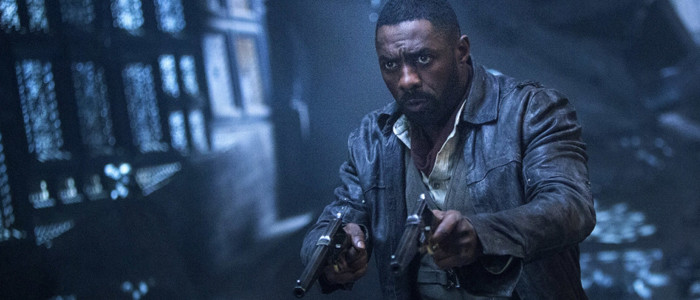
Other Worlds Than These
One of the biggest mistakes The Dark Tower film makes is telling its story through the perspective of Jake (Tom Taylor). It's easy to guess why the filmmakers did this: they thought it would make everything easier to digest. It reeks of studio exec groupthink or lazy "How To" screenwriting manual logic – the mythology is too complex and strange, so we need to be introduced to it through a "normal" person. It's the same approach to something like The NeverEnding Story or Last Action Hero.There are multiple reasons why this just doesn't work in The Dark Tower. First and foremost is the fact that Taylor's performance is rather dreadful. Michael Barbieri, who gave an incredible performance in Ira Sachs' Little Men, appears briefly in the film as a neighbor and friend of Jake, and Barbieri is so clearly the better performer between the two that it'll have you wondering why he didn't land the role of Jake instead. Taylor, for his part, is flat and unbelievable, and seems completely incapable of emoting in big emotional moments – witness the scene where he's dangling off the side of the cliff and utters a cry of fear so void of any real emotion that it borders on laughable.Another reason telling the story through Jake's eyes fails to benefit the narrative is the fact that we never really learn much about Mid-World and the film's mythology in the end. There are frequent exposition dumps, where characters just blatantly say what's supposed to be going on, but none of it really connects. If you want to use Jake as our introduction to all of this complex stuff, you need to actually put this method to use. Otherwise, you're wasting our time.The most frustrating result of this framing device is the fact that Idris Elba, as Roland, is the only element of the film that comes close to really working. Elba, a wonderful actor who might need a new agent at this point, finally had the chance to land a break-out film role here, but the narrative keeps him at bay. Roland should be a bit of an enigma – King, after all, modeled the character on Clint Eastwood's Man With No Name from Sergio Leone's Dollars Trilogy. But by giving too much screen time to Jake, Roland suffers. The only time the film really comes alive is when it lets Elba take control of his character, such as a well-done moment when Roland calmly blocks out a scene of chaos in order to land an impossible shot with his gun.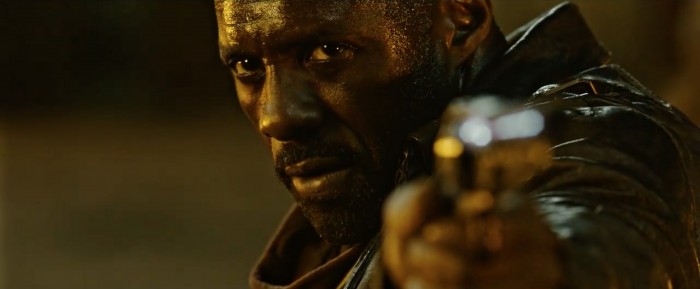 The Dark Tower opens with Jake having a nightmare. A group of children, living in some community clearly not on earth, are being used by the evil Man in Black (Matthew McConaughey) as weapons. It seems that only a child's mind can destroy The Dark Tower, and the Man in Black's plan involves strapping kids who possess the ability to "shine" – just like Danny from King's The Shining – into a chair and shoot laser beams out of their heads into the Tower.I have no idea what the hell this is, or what it came from.This is not in the books, but just like making Jake the focal point of the story, this plot point seems like something a studio exec threw out at a production meeting as a way to simplify the story. In the books, Roland's quest to find the Dark Tower is enigmatic. Roland doesn't even know what the Dark Tower is in the books – he just knows that all life springs from it, which means that it may be the home to some sort of all-knowing god. Roland's quest is a quest for meaning in a meaningless universe, but that's not exactly something that translates well into a big studio blockbuster. So instead we get stuck with mind-lasers.The Roland of The Dark Tower movie doesn't even seem to give a damn about the Tower itself. It's secondary. What he wants is revenge, because the Man in Black killed Roland's father (Dennis Haysbert). Roland and the Man in Black do have a history together in the books, as it's revealed that the Man in Black had an affair with Roland's mother when Roland was still young. The movie doesn't have any use for something like this, though. Again and again the message is resoundingly clear: the book is too complicated, let's dumb it down.
The Dark Tower opens with Jake having a nightmare. A group of children, living in some community clearly not on earth, are being used by the evil Man in Black (Matthew McConaughey) as weapons. It seems that only a child's mind can destroy The Dark Tower, and the Man in Black's plan involves strapping kids who possess the ability to "shine" – just like Danny from King's The Shining – into a chair and shoot laser beams out of their heads into the Tower.I have no idea what the hell this is, or what it came from.This is not in the books, but just like making Jake the focal point of the story, this plot point seems like something a studio exec threw out at a production meeting as a way to simplify the story. In the books, Roland's quest to find the Dark Tower is enigmatic. Roland doesn't even know what the Dark Tower is in the books – he just knows that all life springs from it, which means that it may be the home to some sort of all-knowing god. Roland's quest is a quest for meaning in a meaningless universe, but that's not exactly something that translates well into a big studio blockbuster. So instead we get stuck with mind-lasers.The Roland of The Dark Tower movie doesn't even seem to give a damn about the Tower itself. It's secondary. What he wants is revenge, because the Man in Black killed Roland's father (Dennis Haysbert). Roland and the Man in Black do have a history together in the books, as it's revealed that the Man in Black had an affair with Roland's mother when Roland was still young. The movie doesn't have any use for something like this, though. Again and again the message is resoundingly clear: the book is too complicated, let's dumb it down.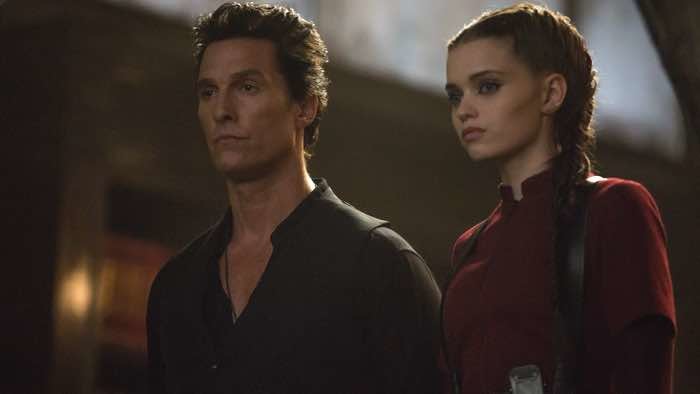
Forgetting the Face of Your Father
Roland and Jake team-up in Mid-World, although just what Jake wants to do is vague. The film has him haunted by his nightmares of Mid-World, the Man in Black and Roland, but the books drop Jake into this setting in a much less direct manner: he's murdered. In the books, Jake is pushed into oncoming traffic and killed, waking up at a Way Station in Mid-World, where he eventually meets Roland. Roland allows Jake to join him on his journey, but their relationship is complicated. Roland is so driven by his quest that he actually allows Jake to fall to his death (apparently you can die more than once in this universe).The film tries to introduce some sort of conflict between Jake and Roland by having Roland obsessed with revenge and mostly indifferent to Jake's plight, yet by the end of the film, we're supposed to believe that Jake and Roland have bonded so much that Roland wants Jake to stick with him and train to become a gunslinger. The film never bothers to explain just why Roland would want this to happen, and the chemistry between Elba and Taylor is non-existent.In fact, none of the relationships or characters in the film really work. Early scenes try to show the bond between Jake and his conflicted mother (Katheryn Winnick), but beyond a few furrowed brows we never get a sense of who Jake's mom is, and we never will, since the Man in Black sets her on fire and reduces her to a pile of ashes. This scene is preceded by a moment where Jake's mother walks in on the Man in Black cooking some chicken in her kitchen, which is perhaps a reference to McConaughey's work in Killer Joe, but is more likely just another stupid moment in a movie filled with stupid moments.A lengthy scene in the middle of the film finds Roland and Jake wandering into a town in Mid-World where we're treated to even more exposition dumps, but aside from a few close-ups on people we're supposed to assume are important, none of them make much of an impact. This sequence in particular seems like the one most decimated by editing, where quieter character moments were likely sacrificed to keep the film moving a steady clip.The various villains who assist the Man in Black might as well be the poorly rendered CGI ghouls from I Am Legend for all the impact they have. Abbey Lee shows up as Tirana – who is this character? What are her motivations? No idea. Jackie Earle Haley is there, doing his Jackie Earle Haley thing. What's his deal? Insert shrug emoji here. Hey look, there's Fran Kranz, playing himself, I guess? Who the hell knows! The movie doesn't even once bother to tell us what his name is.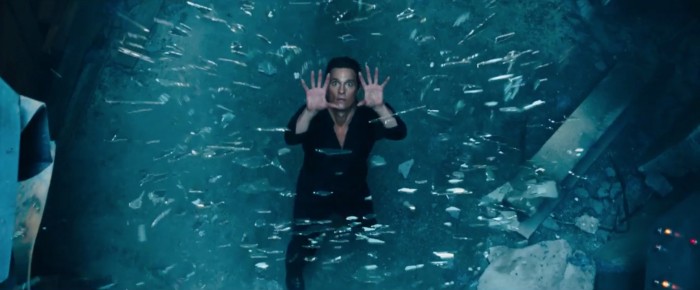 Then there's the Man in Black himself, aka Walter. McConaughey, bless his heart, is trying to do...something here. He's having fun, and clearly relishing moments where he gets to dramatically whip off a black scarf while entering a room. But there's nothing truly distinct about his Man in Black, beyond the fact that he's impossibly powerful – he can literally tell someone to stop breathing and kill them. Making a villain so ridiculously powerful is a mistake in its own right, since it makes him almost invincible, and thus boring. It doesn't help that scenes that are supposed to illustrate how evil he is – like when he walks by a mother and daughter on a bench and commands the daughter to "hate" her mother – come across as laughable.McConaughey's baddie has a rather vague plan to bring the Tower down and unleash evil upon the universe, though just why he wants to do this isn't clear beyond the simple explanation that he's an evil dude. The Crimson King, who wants to destroy the Tower in the books, believes that if the Tower falls he can remake the entire universe in his own evil visage, but the film doesn't even bother to give this motivation to the Man in Black.The Man in Black in the books is a complicated character. He has a long history, with both Roland and with King's other works, having appeared in both The Eyes of the Dragon and The Stand. He's also far more conniving, and his motivations are far more mysterious. He works in service to the book's true main villain, the Crimson King, a character who only gets a cursory mention in the film. Then, after spending the entire film telling us again and again how evil and all-powerful this character is, Roland easily dispatches him with a shot to the head (which is mostly off-screen to maintain the film's PG-13 rating).
Then there's the Man in Black himself, aka Walter. McConaughey, bless his heart, is trying to do...something here. He's having fun, and clearly relishing moments where he gets to dramatically whip off a black scarf while entering a room. But there's nothing truly distinct about his Man in Black, beyond the fact that he's impossibly powerful – he can literally tell someone to stop breathing and kill them. Making a villain so ridiculously powerful is a mistake in its own right, since it makes him almost invincible, and thus boring. It doesn't help that scenes that are supposed to illustrate how evil he is – like when he walks by a mother and daughter on a bench and commands the daughter to "hate" her mother – come across as laughable.McConaughey's baddie has a rather vague plan to bring the Tower down and unleash evil upon the universe, though just why he wants to do this isn't clear beyond the simple explanation that he's an evil dude. The Crimson King, who wants to destroy the Tower in the books, believes that if the Tower falls he can remake the entire universe in his own evil visage, but the film doesn't even bother to give this motivation to the Man in Black.The Man in Black in the books is a complicated character. He has a long history, with both Roland and with King's other works, having appeared in both The Eyes of the Dragon and The Stand. He's also far more conniving, and his motivations are far more mysterious. He works in service to the book's true main villain, the Crimson King, a character who only gets a cursory mention in the film. Then, after spending the entire film telling us again and again how evil and all-powerful this character is, Roland easily dispatches him with a shot to the head (which is mostly off-screen to maintain the film's PG-13 rating).
By the time The Dark Tower concludes, the film expects its audience to be clamoring for more. Think back to the end of Peter Jackson's first Lord of the Rings film, The Fellowship of the Ring. That films with its well-established characters being split apart, going off into different directions – directions we as an audience want to accompany them on. There was a prevailing feeling as Jackson's film ended of regretting the fact that we had to wait an entire year before we got to continue this journey. As The Dark Tower closes, with Jake and Roland heading back to Mid-World, there's nothing even close to that feeling. We could care less if we ever spend any more time with these characters. It's a stunning misfire.
The Waste Lands
In 2007, Stephen King told an audience at New York Comic Con that Damon Lindelof and J.J. Abrams would be bringing his fantasy epic series The Dark Tower to life. King had resisted selling off the film rights to the series for some time, stating "I didn't think much of the chances of it being a good movie." Perhaps he should've continue to listen to that instinct.Lindelof and Abrams were unable to crack The Dark Tower, and eventually Ron Howard took over the project. Howard's involvement saw a plan to make both a film trilogy and TV mini-series events to encapsulate the vast mythology created in King's books.This, too, doesn't come to fruition.Filmmaking duties eventually fell to A Royal Affair helmer Nikolaj Arcel, who finally got the film made, but not altogether smoothly. According a report in Variety, three early test screenings of Arcel's film were a disaster, with test audiences unable to understand the film's interpretation of King's admittedly wonky mythology.The fault's of The Dark Tower film aren't Arcel's alone, although Arcel's direction does leave much to be desired. What truly sinks the film is the flimsy screenplay from Akiva Goldsman, Jeff Pinkner Anders, Thomas Jensen and Arcel. Of course, there's a good chance the script was much more in-depth and much of it was cut to deliver the bare bones 95 minute film that hit theaters last week, but as-is, it leaves much to be desired.And, strangely enough, it ignores almost everything that made the source material so special.King's books contain some rather complex mythology – mythology that was always going to be difficult to translate to film. But The Dark Tower doesn't even seem to make an attempt at doing so. Instead, it's like a lifeless Cliffs Notes take on the material, or a Wikipedia entry loaded with [citation needed] sentences.In The Dark Tower's defense, some internet marketing for the film did try to address this jettisoning of familiar source material by hinting that this wasn't an adaptation of the book,s but rather a sequel to them. A pretty big spoiler for The Dark Tower books follows, so if you've never gotten around to reading them and plan on it, maybe skip ahead. Then again, this is a spoiler review, so what else did you expect?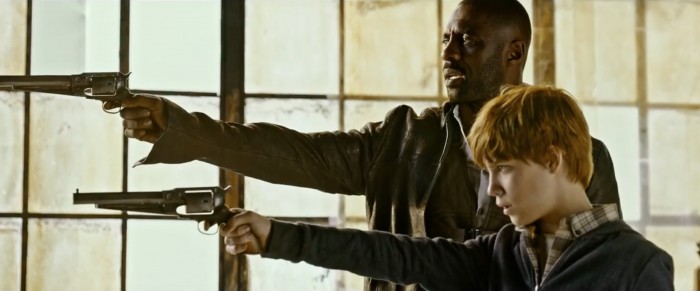 The last book in the series, The Dark Tower, ends with the shocking, devastating reveal that Roland, who has spent the entire book series on a quest to reach the Dark Tower, has already reached it dozens of times before. And every time he reaches it, he's forced through a door that drops him right back at the start of the story, his memory of the journey erased, cursed to re-live it all again.Before the film's release, King posted an image on Twitter of the Horn of Eld, a horn that has been in Roland's family for generations. Roland abandoned the horn in a battle that took place long before The Dark Tower books began, and the books hint that his journey would've been vastly different had he had the horn. At the end of The Dark Tower (the book), when Roland is forced to start his journey all over again, he is now in possession of the horn. The image King tweeted has the words "Last Time Around" emblazoned across it. In other words, the films are perhaps Roland's final journey – this time, perhaps, when he reaches the Tower, he won't be forced to start all over again.But here's the thing: the film never even mentions the damn horn. I don't even think they show it, once. Again, there's a good chance there's a wealth of deleted scenes, and perhaps there we get a glimpse of the horn. But the film that hit theaters neglects it entirely. And even if we want to assume that this film is just another journey for Roland – a sequel instead of a straight adaptation – why would things be so drastically different this time? Why ignore whole sections of the books?Dreadful reviews were not enough to keep eager fans away from The Dark Tower's opening weekend, but the film took in a meager $19.5M, and word of mouth is likely going to kill it off. As of now, Sony is still talking about sequels, and there's still a plan to create a TV series spin-off. The source material is, after all, ripe for the type of "cinematic universe" that execs salivate over. But one can't help but think of the recently launched, instantly unpleasant Universal monsters "Dark Universe", which kicked-off with the abysmal The Mummy. Once again, the lesson seems to be that you shouldn't launch your cinematic universe if you have yet to nail the first installment.So far, no one involved with The Dark Tower movie has lobbed the tepid "We made this for the fans!" defense, probably because they know the film clearly doesn't care much about the fans. If it did, it wouldn't have completely ignored the things that made fans fall in love with King's books to begin with. And while it may be heartbreaking to some who have waited for so long to finally see a Dark Tower film only to end up with this rot, perhaps there's some comfort to be had in words that King himself once said."There was a college freshman who came to interview James M. Cain towards the end of his life," King said in a 2006 interview. "And this guy came and sat down with Cain, and the first thing that he said was, he moaned about how the movies had ruined all James M. Cain's books. Cain said, 'No, they haven't, young fella; they're all right behind me,' and pointed at the shelf in the back of the room. And that's true, they're all there so...I think it's hard to ruin a book because they're still up on shelves."The Dark Tower film may have been an instant disappoint, but as long as King's books remain up on the shelves, the Tower will never fall.
The last book in the series, The Dark Tower, ends with the shocking, devastating reveal that Roland, who has spent the entire book series on a quest to reach the Dark Tower, has already reached it dozens of times before. And every time he reaches it, he's forced through a door that drops him right back at the start of the story, his memory of the journey erased, cursed to re-live it all again.Before the film's release, King posted an image on Twitter of the Horn of Eld, a horn that has been in Roland's family for generations. Roland abandoned the horn in a battle that took place long before The Dark Tower books began, and the books hint that his journey would've been vastly different had he had the horn. At the end of The Dark Tower (the book), when Roland is forced to start his journey all over again, he is now in possession of the horn. The image King tweeted has the words "Last Time Around" emblazoned across it. In other words, the films are perhaps Roland's final journey – this time, perhaps, when he reaches the Tower, he won't be forced to start all over again.But here's the thing: the film never even mentions the damn horn. I don't even think they show it, once. Again, there's a good chance there's a wealth of deleted scenes, and perhaps there we get a glimpse of the horn. But the film that hit theaters neglects it entirely. And even if we want to assume that this film is just another journey for Roland – a sequel instead of a straight adaptation – why would things be so drastically different this time? Why ignore whole sections of the books?Dreadful reviews were not enough to keep eager fans away from The Dark Tower's opening weekend, but the film took in a meager $19.5M, and word of mouth is likely going to kill it off. As of now, Sony is still talking about sequels, and there's still a plan to create a TV series spin-off. The source material is, after all, ripe for the type of "cinematic universe" that execs salivate over. But one can't help but think of the recently launched, instantly unpleasant Universal monsters "Dark Universe", which kicked-off with the abysmal The Mummy. Once again, the lesson seems to be that you shouldn't launch your cinematic universe if you have yet to nail the first installment.So far, no one involved with The Dark Tower movie has lobbed the tepid "We made this for the fans!" defense, probably because they know the film clearly doesn't care much about the fans. If it did, it wouldn't have completely ignored the things that made fans fall in love with King's books to begin with. And while it may be heartbreaking to some who have waited for so long to finally see a Dark Tower film only to end up with this rot, perhaps there's some comfort to be had in words that King himself once said."There was a college freshman who came to interview James M. Cain towards the end of his life," King said in a 2006 interview. "And this guy came and sat down with Cain, and the first thing that he said was, he moaned about how the movies had ruined all James M. Cain's books. Cain said, 'No, they haven't, young fella; they're all right behind me,' and pointed at the shelf in the back of the room. And that's true, they're all there so...I think it's hard to ruin a book because they're still up on shelves."The Dark Tower film may have been an instant disappoint, but as long as King's books remain up on the shelves, the Tower will never fall.

